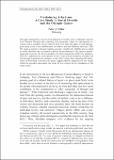| dc.contributor.author | Miller, Peter J. | |
| dc.date.accessioned | 2022-10-04T22:13:18Z | |
| dc.date.available | 2022-10-04T22:13:18Z | |
| dc.date.issued | 2022 | |
| dc.identifier.citation | Miller, Peter J. "Proclaiming Arkadians: A Case Study in Social Identity and the Olympic Games." Nikephoros 28 (2015–2022): 187–202. | |
| dc.identifier.uri | https://hdl.handle.net/10680/2018 | |
| dc.description.abstract | This paper analyzes the role of social and political identity in two Arkadian epigrams from Classical Olympia. By examining these epigrams in light of contemporary so-ciology and as complex literary texts in their own right, the paper reveals that epi -grams play a role in the establishment of Hellenic and sub-Hellenic identities. CEG 381 posits a narrative wherein Oresthasion was visited by the theoroi, and in which an ethnic identifier can be situated as part of the proclamation. The epigram demon -strates the necessity of a diverse audience for the construction of effective identities. CEG 383 underlines the civic identity of the victor and the similarity of father and son through its periphrastic reference to the father’s name. By connecting this decla-ration to Mantinean synoikism, the paper suggests that the epigram does not simply reflect the synoikist movement, but could be the catalyst for the foundation of the urban centre. | en_US |
| dc.language.iso | en | en_US |
| dc.publisher | Weidmann | en_US |
| dc.rights | info:eu-repo/semantics/openAccess | en_US |
| dc.subject | ancient greece | en_US |
| dc.subject | ancient sport | en_US |
| dc.subject | ancient athletics | en_US |
| dc.title | Proclaiming Arkadians: A Case Study in Social Identity and the Olympic Games | en_US |
| dc.type | Article | en_US |

